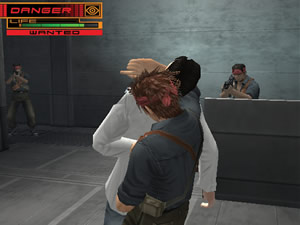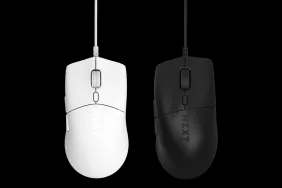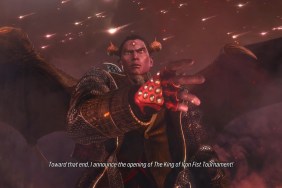Don’t believe his lies.
My interest in Spy Fiction began with its title. A fiction is
a story, so the title can be read as “Spy Story.” But a fiction is also a made-up
event, so you could read it as “Spy Lies.” Either way, I was anticipating a subtle,
classy stealth game.
Well, now I know why I’m not involved in international espionage, because my
instincts couldn’t have been farther from the truth. Though it borrows liberally
from the top-notch Metal
Gear series, Spy Fiction is not smooth, nuanced, or well-written.
It is, simply put, a very sneaky piece of propaganda.
The story details the exploits of a spy team known as the S.E.A. and its strike-force,
Phantom. You play as a Phantom agent attempting to decode the scheme of an
evil terrorist group known as Enigma. In a Memento-like twist, the story begins
at the ending, when Enigma has already unleashed their doomsday weapon. Another
Phantom agent has already been slain, and you’re about to face off against
the game’s wacky antagonist, Dietrich Troy. Then the game begins a second time
at a biochemical research center where you’re looking into some suspicious
goings-on.
It might sound interesting, but the plot is actually a giant, campy mess. The
male protagonists say ridiculous things while the villains include such riveting
stereotypes as a fat, evil scientist with bed-head, a Chinese dragon lady,
and an effeminate German lunatic with a stigmata. Spy
Fiction‘s writing is simply awful, which means the story is almost incomprehensibly
bad. Some will appreciate it from a poorly-translated-Japanese angle, but that
wears off after about an hour.
Oddly, you can only access the gameplay Tutorial via the in-game pause. It certainly gets you up to speed with the basic control, but its placement doesn’t make any sense. At least, it wouldn’t make sense in a good game. In Spy
Fiction, where you’re asked if you want to quit every time you save and a woman using an electric shaver is seen as commonplace by most of the NPCs, you quickly learn to stop looking for reasonable answers.
Throughout Spy Fiction, you’ll be engaged in one of three activities: sneaking around in disguises, navigating past lasers, or beating up brainless enemies. Sneaking around in disguises is the most entertaining chore due to its relative ease. You simply have to snap a picture of an NPC using your snazzy spy camera and their visual identity is at your disposal. You can then jump into a closet, box, or van and your high-tech spy suit will assume the photographed NPCs appearance. Form of’a chameleon!
The point of such tomfoolery is that in order to make it through certain doors and checkpoints, you must look the part. Unfortunately, only a handful of NPCs have unique identities, and these are the only ones who will freak out if you bump into them while wearing their face as a disguise. Otherwise, you’re dealing with a bunch of morons.
For example, if you steal the identity of a stripper and meander about a distinctly
stripper-free area, security guards will stop you all the time. But instead
of doing anything stripper-ish to get yourself off the hook, you lamely show
the guards your security tags and they’re convinced you’re in the clear. Fiction also means “jive,” you know.
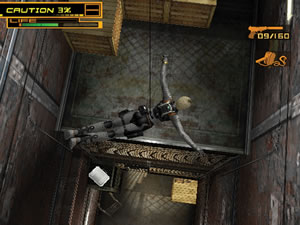 Every disguise comes with a limited number of security tags, and once you run out, any guard who sees you will call for back-up and start shooting. While some disguises generate very little attention, others will be scrutinized every single time they’re spotted. If two guards are standing next to one another and they both see you, they’ll both check you out, one after the other. So there go two tags. However, while the second guard is busy frisking you, the first will return to his initial position and spot you again. Since you usually only get three tags per disguise, you can easily lose all your clearance in one fell swoop thanks to NPCs with zero memory.
Every disguise comes with a limited number of security tags, and once you run out, any guard who sees you will call for back-up and start shooting. While some disguises generate very little attention, others will be scrutinized every single time they’re spotted. If two guards are standing next to one another and they both see you, they’ll both check you out, one after the other. So there go two tags. However, while the second guard is busy frisking you, the first will return to his initial position and spot you again. Since you usually only get three tags per disguise, you can easily lose all your clearance in one fell swoop thanks to NPCs with zero memory.
Conversely, if you find a disguise that no one finds suspicious, you can effectively
become invincible thanks to your handy-dandy taser disguised as an electric
razor. You can breeze through levels shocking everyone in your path, even if
you’re disguised as a little girl. “Hmmm, a Japanese school girl running towards
me with an electric shaver? Nothing very unusual about tha-XZZZZZSHHHHCHSSS”.*silence*””
If your cover is blown, you’ll have to rip off your costume and fight. This involves one of two things: using a flash-pen (a flash-bang that looks like a pen) to knock everyone out and then hiding, or melee attacking everyone at once and then hiding. Although the melee option almost always works, you only have one attack button and one combo. Mash, mash, mash, then mash some more!
The big problem is the irritating enemy respawn, which results in you always fighting three enemies. If you kill one bad guy, another will immediately spawn in to replace him. This renders the gunplay almost useless; winning a shoot-out is just about impossible. While you do get guns in Spy
Fiction, they’re really only useful when it comes to deactivating lasers. You’ll spend more time hiding from guards than firing at them.
Fortunately, the enemies are too stupid to find you. Even if a guard is looking right at you when you turn on your stealth suit, he’ll walk over to a location near you and fire over your head while repeatedly hollering, “Maggot on the run!’ Then he’ll forget he saw you and join his comrades in searching for you.
So the action boils down to standing there comboing the group of three guards, knocking them all out, and then hiding for a couple minutes while things cool down. In another cue from Metal
Gear, you have a little Danger sensor built into your HUD to tell you if you’re in the clear or not. If you put your back to a wall and press the L1 button, you’ll become invisible, and if you’re invisible for long enough, “Danger’ will change to “Searching’, which one minute later turns into “Caution,’ which devolves into “Safety’ after another minute. Every time you get into a fight, you wind up sitting or hanging somewhere for about three minutes, because every door in the game locks and won’t open until you get back to “Safety.’ Add a little bad luck to this system and you can spend nine out of ten minutes sitting in a corner waiting for the game to allow you to continue playing. Watching a microwave heat things up is more entertaining than the combat in Spy
Fiction.
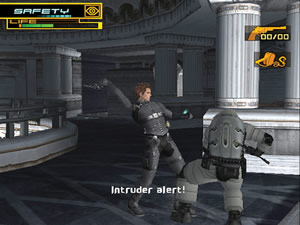 The camera contributes to the game’s long list of maladies. While it usually
The camera contributes to the game’s long list of maladies. While it usually
follows behind your character and is controllable via the right stick, every
few rooms or so it inexplicably switches to a fixed perspective. These rooms
are often divided into several sections by desks and bookshelves, so you’ll only
get a camera view of one portion of the room at a time. It winds up being wildly
disorienting and will have you running in circles.
Although the framerate chugs occasionally, Spy Fiction‘s graphics aren’t bad so much as uninspired. The lighting isn’t terribly complicated for a stealth game and the textures are flat throughout. However, the game usually looks pretty clean.
The sound, though, takes it right back into the gutter. The voice-acting demands
clearly maxed-out the talents of a bunch of Q&A testers and their girlfriends,
a pretty tragic display of vocal ineptitude. The music is instantly reminiscent
of Pilot
Wings for the SNES – dated and low-tech, but oddly appealing.
To its credit, Spy Fiction occasionally seems bad in a good
way thanks to some unintentionally funny B-movie schlock and ridiculous dialogue.
But make no mistake- this is a bad game and isn’t worth your attention unless
you simply must run around as a stripper and taser people. At forty bucks,
you’d have to be pretty gullible to buy into this spy’s lies.
-
Interesting costume idea
-
Schlock appeal
-
Which is unintentional
-
Broken gunplay
-
Retarded enemies
-
Tons of down time
-
Terrible writing
-
Frustrating and boring
